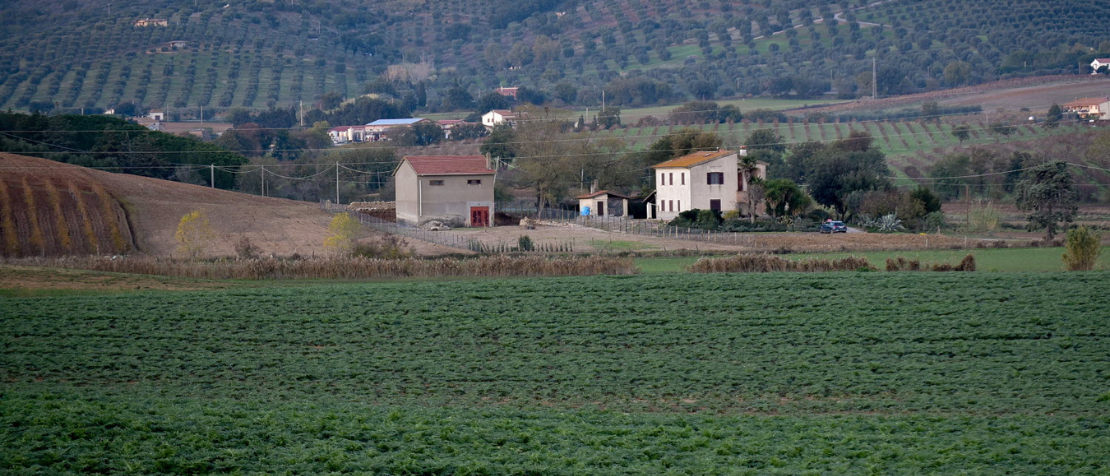From Italy to Georgia: regenerating rural communities with agritourism

©FAO/Victor Sokolowicz
Exploring Georgia’s gastronomy offers tourists unique insights into the country and its culture.
Enriching tourists’ experiences also has the potential to attract more visitors which can generate vital income in rural communities.
The European Bank for Reconstruction and Development (EBRD) and the Food and Agriculture Organization of the United Nations (FAO) are working to unite Georgia's unique food heritage, traditions and landscapes, by strengthening the links between agriculture and tourism.
Last year, EBRD and FAO organized a study tour to Tuscany and Campania for representatives of Georgia’s producers’ associations, agritourism operators, and public authorities to learn from Italy’s experience and expertise in agritourism.
"Georgia boasts stunning landscapes and ancient food traditions,” said Rusudan Kacharava of the Georgian Farmers Association, which develops agritourism standards for Georgia. “Visitors to Georgia want to connect with local culture more deeply – as they do in Italy. Italian agritourism experts offered us valuable insights.”
The study tour was the latest in a series of activities from EBRD and FAO to support Georgia’s sustainable agritourism – which has also seen the development of an agritourism strategy and several training events for industry players.
Enabling environment for agritourism
During the study tour, public officials, food producers and agritourism owners in Tuscany and Campania shared their experiences in building distinctive agritourism ventures.
“We learned that successful agritourism needs a regulatory framework which empowers local producers, artisans and entrepreneurs” said Nano Korshia, a leading specialist at the Georgian Parliament Agrarian Affairs Committee. “We are inspired to propel new agritourism legislation to promote catalytic investment in this sector and the development of agribusiness skills.”
Agritourism for sustainable development
“Italian experiences show that sustainable agritourism provides economic, social and environmental benefits in remote areas,” said Nemanja Grgic, Principal Manager of Agribusiness Advisory at EBRD. “Producers can diversify their commercial activities, generate additional income, support local livelihoods, and link to national and global food chains.”
Agritourism can help develop new job opportunities in rural areas.
One agritourism venture – based at a vegetable farm in Cortona, Tuscany – offers tourists an innovative cooking class program on pasta and cheese making.
“The farm and its connected cooking and catering activities have generated opportunities in the region,” said Salvadori. “I source the products I don’t grow myself from neighboring farms. When people visit, they can learn about local producers. This network is key for our business and it’s also vital in developing our community.”
As Sustainable Gastronomy Day took place last month, it is evermore clear that linking tourist industry players with local producers of specialty food can help to preserve distinctive local food heritage. This can also empower rural women, who are often custodians of traditions.
In Monteverna – a small Campanian village populated by veteran local producers – the food tourism trend has reinvigorated the community. In this small village, there is a tomatoes producer, a beekeeper, and an olive oil mill. All these small businesses offer tasting experiences, where tourists can learn more about these unique products and the local families and communities who produce them.
Food tourism can also help to conserve agricultural biodiversity – as local recipes often rely on specific local plant varieties and animal species.
In the city of Caiazzo near Naples, renowned Chef Franco Pepe relies on 30 provincial producers of top-quality food products, including local mozzarella and tomatoes, to produce his renowned pizza.
“We found that guests were excited to meet local people and we were eager to support our exceptional producers in the Alto Casertano area,” said Pepe. “We set up the ‘Pizza Hub’ initiative, enabling visitors to meet our unique suppliers firsthand. Artisans, agritourism businesses, homestays, farmers and entrepreneurs are working together with a balanced, sustainable and authentic approach to tourism development.”
Knowledge transfer from the Italian agritourism maestria
Experiences from Italy show how successful agritourism development can increase the value of local produce and food heritage, while supporting sustainable production methods and boosting rural economies.
The vision of the FAO/EBRD initiative is to replicate these Italian successes in the Georgian context.
“Knowledge transfer from the Italian context can inspire Georgia to further incentivize sustainable agritourism,” said Florent Tomatis, Value Chain and Agribusiness Specialist at the FAO Investment Centre. “Our goal is to regenerate rural economies, landscapes and livelihoods through responsible agritourism.”
6 July 2023, Tbilisi, Georgia
